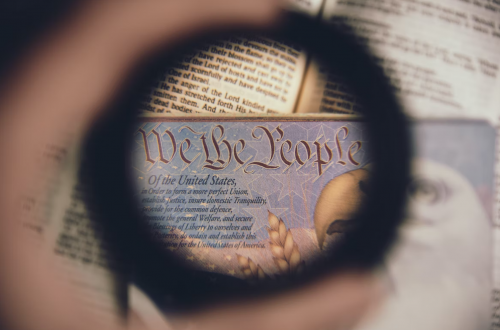![]() No, President Bush isn’t really in my backyard, but it looks like his Presidential Library will be. According to the New York Times, Dallas’ Southern Methodist University will likely be the site for the president’s future library and museum.
No, President Bush isn’t really in my backyard, but it looks like his Presidential Library will be. According to the New York Times, Dallas’ Southern Methodist University will likely be the site for the president’s future library and museum.
 Unfortunately, some of SMU’s faculty are resisting the prospect of a Bush library on their campus. Two anti-war professors from SMU’s Perkins School of Theology have co-written an opinion editorial in the campus newspaper opposing the library. After weighing the benefits of having the library on their campus, they ask this question:
Unfortunately, some of SMU’s faculty are resisting the prospect of a Bush library on their campus. Two anti-war professors from SMU’s Perkins School of Theology have co-written an opinion editorial in the campus newspaper opposing the library. After weighing the benefits of having the library on their campus, they ask this question:
“Do we want SMU to benefit financially from a legacy of massive violence, destruction, and death brought about by the Bush presidency in dismissal of broad international opinion?
“What moral justification supports SMU’s providing a haven for a legacy of environmental predation and denial of global warming, shameful exploitation of gay rights, and the most critical erosion of habeas corpus in memory?”
For these two professors, the future location of President Bush’s library is a moral question. Because President Bush has presided over an unjust war and because his other policies are patently immoral, they argue that to enshrine Bush’s legacy on SMU’s campus would be to give a tacit assent to his presidency. Thus the library would be an albatross around the university’s neck. The professors further argue:
“In addition to our concerns already expressed, new revelations may well come to light that would render SMU’s decision to house the President George W. Bush Presidential Library highly regrettable.”
Their take on the president’s legacy is a dim one indeed (perhaps they anticipate his impeachment?).
Of course, the professors’ argument is only as convincing as is the accuracy of their prediction of what President’ Bush’s legacy will be. Theirs is not a consensus view either of the President or of the reasons he gave for going to war in Iraq. And despite their less-than-even-handed prognostication, only time will tell how history will judge President Bush and the war in Iraq. The war is not even over yet.
In the meantime, the Presidential library will be built somewhere, and it will become a permanent, prestigious repository for presidential papers and artifacts that will attract scholars, historians, and interested citizens from all over the world (as the professors duly note). Is it really necessary, therefore, to judge the President’s legacy before agreeing to build his library?
Even if history does judge President Bush harshly, would that judgment make his presidential library any less of a boon to our community? I think not. It would probably increase it. Bush’s legacy, therefore, for better or for worse, should not deter SMU from welcoming his library to their campus.
I doubt that a small number of liberal professors from SMU’s divinity school will prove to be the decisive factor in determining the site for the library. But it would be a shame if arguments such as theirs turned public opinion against the library. It’s not outside the realm of possibility that such a thing could happen. If it did, it might cause Dallas to miss all the benefits that such a library would bring to our city.
I, for one, hope that doesn’t happen.
Sources:
“Faculty at S.M.U. Voices Concern About Bush Library” – by Ralph Blumenthal (New York Times)




10 Comments
sofyst
I do believe that this represents the difference between how one can simply not support a President, and how one can literally hate the man. I know that I was never one to support Clinton or what he did, I didn’t like the man, but if he planned to place his library in my hometown, ‘shoo yo’ bring it!’.
dennyrburk
Sofyst,
You are right. This is classic Bush-hatred. One doesn’t oppose a presidential library simply because one doesn’t like the president for whom it is being built.
This kind of opposition suggests that these professors have moved President Bush out of the category of “Bad President” and into the category of “Hitler.” That is why their argument is a little too muddled by their own passions to be taken seriously.
Thanks,
Denny
sofyst
I personally do not understand why anyone would oppose a large library being build within their reach anyway.
I love libraries so much that I do believe I may be too biased to comment on this article anyway. I think that I would like a library to be built in Athens, even if it did commemorate the life of Cindy Sheehan.
jeff miller
A university is not of a nature to love man, bird, or beast. To such institutions the dead albatross is of no more concern than the God who made them.
So what is one more albatross?
Bring on the library for what it is worth.
Denny, commenting on politics is naturally enveloped in the discourse of “history†from man’s perspective, but I enjoy remembering that the “judgment of History†on the administration (and everything else) is only a sub-plot to the large story and true judgment that is being unfolded but from a different perspective.
btw In what sense was Jesus an anti-war proffesor in his mission and ministry?
Congratulations Dallas on the announcement of a future library.
dennyrburk
Jeff,
I believe Jesus was anti-war in the sense that only His eschatological war will ultimately prevail against evil. He promises to fight the war to end all wars in the cosmic renewal of all things. He will in fact return bodily, and in kingdom power he will make war on his enemies (2 Thess 1:5-10).
Revelation’s depiction of Christ’s return is almost macabre. He descends from heaven to make war on the nations who have afflicted God’s people. He has a sword coming out of his mouth, and his garments are dipped in blood (Rev 19:11-16).
I think the Bible is anti-war in the sense that no war on this side of Christ’s return will effect perfect peace and justice. All wars will be fail in that regard.
That is not to say that there is no such thing as a “just war” this side of Christ’s return. It is to say that even “just wars” will not usher in the kingdom of God. Only Jesus does that.
Thanks,
Denny
jeff miller
I am not comfortable with a train of thought that says “Jesus’ eschatalogical war” will come one day and bring the perfect peace but until then his followers are left with conventional war and the maintenance of this world’s peace and this world’s legitimacy.
Denny, you don’t think Jesus’ body has a giant sword in the place of a tongue because of this passage do you? Not that it is impossible but it might be more fitting to think of this passage in Revelation as a description of the war of the “word of God.”
Paul in a less symbol-filled genre says: “For though we walk in the flesh, we do not war according to the flesh, for the weapons of our warfare are not of the flesh, but divinely powerful for the destruction of fortresses(2 Corinthians 10:3-4).”
By the way, in looking at Revelation, I like “7 parallel perspectives” reading better than a straight time-linear ch.1 to ch.22 approach. Helpful commentaries in this approach have been written by Leon Morris and James Howard Knotek.
So that the victorious warriors can be spoken of in this way as well:
“Now the salvation, and the power, and the kingdom of our God and the authority of His Christ have come, for the accuser of our brethren has been thrown down, he who accuses them before our God day and night. “And they overcame him because of the blood of the Lamb and because of the word of their testimony, and they did not love their life even when faced with death (Revelation 12:10-11).
Yours,
Jeff
dennyrburk
Jeff,
I do not think that “Jesus’ followers” are left with “conventional war” as an option for its mission. I do think that God has placed the “sword” in the hand of “authorities” who have the responsibility to exercise that power for good and not evil (see Romans 13 and the just war tradition flowing from it).
No, I do not believe that the sword coming out of Jesus’ mouth in Revelation is literal (for my approach to Revelation see Richard Bauckham’s The Theology of the Book of Revelation). But I do think Jesus will return as a conquering king who will destroy His enemies, and rebellious “nations” will be among those He conquers. Are suggesting that you don’t believe this?
Thanks for the comments.
Sincerely,
Denny Burk
jeff miller
Denny,
I do think that the day of the lord will come with unveiled glory. In that day those with blood stained hands who refused to repent, not merely of a few misdeeds, but of a whole way of life, a life of refusing God’s ultimate answer to Cain’s question, “am I my brother’s keeper?” which he answers in a preliminary way in the life of Joseph and in an ultimate way in the earthly life and ministry of Jesus Christ.
For all those who have refused God’s answer and God’s way, there will be an undeniable defeat. Their vain and temporary glory will come to an end and they will not know the life of the eternal age in which legitimacy lives on.
I would think that “just war theory” flows from Romans 13 only in a similar to the way “sacramental theology” flows from the Gospel…artificially. These artificial appendages are most attractive to us when we are unwilling to actually set at Jesus feet and learn of him. I say unwilling with some humility because the tendency is with us all.
Notice that Romans 13 does not speak of the “responsibility of those in authority” rather it speaks of what they actually accomplish. Paul could speak of whatever administration was in power, without qualification, as the “minister of God.”
Paul’s understanding of geo-politics was strongly taught by all that God spoke during Israel’s Exile (btw an extraordinary period of revelation).
God had proved himself willing to call men from every place. Including lives of opposed military service (see Luke-Acts for examples). But I think we should also be aware of the direction that He was and is calling them. I don’t want to read the teaching of Christ in an unnaturally legalistic way that considers his prohibitions as an end in themselves. Yet I wonder what Christ’s teaching to take no oath would do to those military commanders who in order to maintain their career track would be required to swear an annual oath of fealty to Caesar.
Anyway , Just War Theory, as I have mentioned before, seems to have little to do with the people of God; whether we are looking at Israel under Moses or Jesus.
With appreciation for your thoughts and your love for Christ,
Jeff
Pingback:
Pingback: